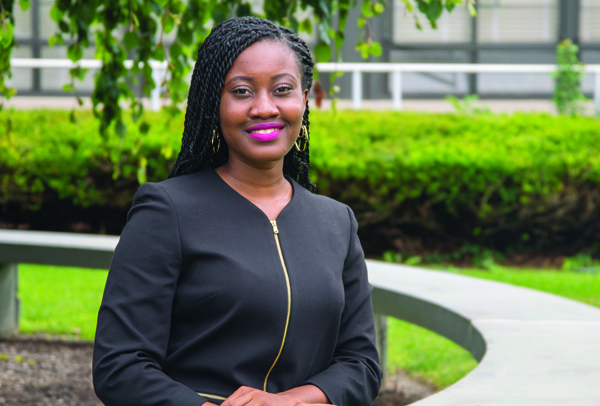2018 Harpur Fellows: Ifeoluwa Shoola
Senior returns to Nigeria to promote innovation to school children

Ifeoluwa Shoola is inspiring the next generation of innovators.
“[If you] think innovatively and think creatively you’re going to make a difference in the world,” she said.
Shoola, a senior majoring in integrative neuroscience and minoring in Africana studies, returned to her home country of Nigeria this summer for her Harpur Fellows project, creating the Ogbomosho Innovation Challenge.
“It was to introduce a mindset to the community, especially to the children, and let them know they can make a change to the world,” she said. “That [change] starts with their own environment.”
Shoola grew up in Ibadan city, the capital of Oyo State, Nigeria, and went to Bowen University in Iwo, Nigeria, before transferring to Binghamton University. Over her last three years at Binghamton, Shoola found friends and resources that motivated her to make a change.
“It’s the type of place where you can walk by someone and smile and they’ll smile back,” Shoola said. “The administration is also invested in student success − the more I find out about these resources, the more I’m amazed that they even exist!”
After reading the Harpur Fellows features on the wall near Jazzman’s cafe, Shoola decided to conceptualize her own project. Aiming to give back to her community, she reached out to a few contacts in Nigeria.
“I didn’t want to go solo,” Shoola explained. “I wanted to work with a community-based organization because then I would have more reach, more contacts, more influence, which would allow a greater impact.”
She decided to team up with Children that Change the World (CTCTW), a radio station that aims to teach underserved Nigerian children new critical and creative thinking techniques. They exchanged ideas and ultimately created the Ogbomosho Innovation Challenge.
“We told [the participants]: ‘Think of a problem in your local community and come up with a solution that’s creative and original,’” Shoola explained.
Before Shoola applied for her grant, she spoke to several Harpur Fellows who previously completed projects in Africa: Mmekom Udosen, who led a female empowerment workshop in Uyo, Nigeria; Rachel Lubinga, who did work on feminine hygiene in Kampala, Uganda; and Emma Ryan, who worked on internet accessibility in Worawora, Ghana.
“That’s what Binghamton University was able to give to me,” Shoola said. “I was able to meet students from all of these backgrounds and learn from them.”
After Shoola was chosen as a Harpur Fellow and given a grant of $4,000, she sprang into action. Working with CTCTW, she sent flyers with information on the competition to schools and to the city of Ogbomosho, advertised it on the radio and shared the competition on social media.
Though Shoola was working with a team, she quickly realized that this project was bigger than anyone could have anticipated.
“It wasn’t just my team,” Shoola explained. “It was my friends who helped with video production or teachers who would come ask questions. We even had a principal tell us to talk to the Ministry of Education, who gave us personal contacts.”
Organizing her project was difficult at times, but Shoola had the resources and the drive to persevere.
“It was the good kind of stress, where you know you did something for the world,” Shoola said. “At the end of the day you can rest at peace.”
The support from parents and students in Ogbomosho was also motivating.
“It was a whole community effort and it was nice to see people in the community invested in the success of their children,” Shoola said. “They were willing to do anything to help.”
The competition incentivized collaboration and divergent thinking, leading to unique community outreach projects.
“I pushed teamwork because I know the importance from all of the team work I’ve done at Binghamton,” Shoola said. “You have to take lessons and take feedback from other people.”
Shoola and her team helped students tailor their projects, teaching them an array of skills from PowerPoint to problem-solving techniques. Participants presented their projects and went through two rounds of judging before three winners were chosen. The top three projects received prizes, but everyone received a participation certificate.
“The competition wasn’t just for the prizes,” Shoola said, “It was the mindset that they left with.”
Shoola’s dedication and excitement was reflected by the participants.
“I could see that the things we did were taking root in their hearts,” Shoola said. “They would see problems and want to solve them.”
The competition may have ended, but Shoola’s impact is still present.
“It [became] a culture where they were not afraid to ask questions or propose answers to the questions, because that’s how you put yourself at the forefront of this world.”
They’re currently planning a second innovation competition in Ogbomosho at Ladoke Akintola University of Technology.
“It’s now become a motivation for me to do more,” Shoola said. “Especially when it comes to children in Nigeria − and Africa as a whole. If we can just give them a platform [everyone] will be wowed.”
Working at Binghamton University with REACH, the High Hopes Helpline and the Dean’s Team, Shoola has also left her mark on campus.
“When I was a part of the Dean’s Team, I wore a T-shirt that had a quote by Margaret Mead,” Shoola recalled. “It said: ‘Never doubt that a small group of thoughtful, committed citizens can change the world; indeed, it’s the only thing that ever has.’”
Shoola put the same quote on her shirts for the Ogbomosho Innovation Challenge. She sent a picture to Jennifer Keegin, who ran the Dean’s Team. Keegan replied and thanked Shoola, saying she was almost in tears.
“In that moment I knew that she felt that she had made an impact on me,” Shoola said. “She gave me something that I take and share, everywhere that I go.”
